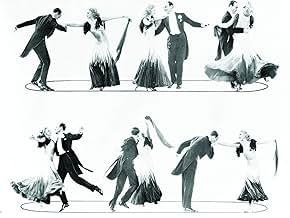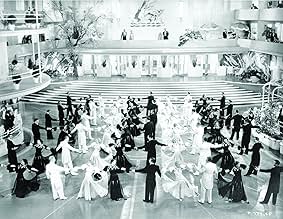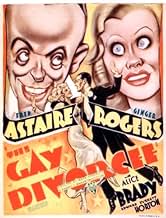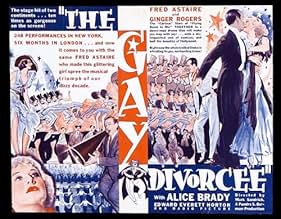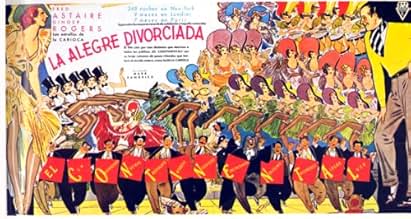IMDb RATING
7.3/10
9.1K
YOUR RATING
A woman thinks a flirting man is the co-respondent her lawyer has hired to expedite her divorce.A woman thinks a flirting man is the co-respondent her lawyer has hired to expedite her divorce.A woman thinks a flirting man is the co-respondent her lawyer has hired to expedite her divorce.
- Won 1 Oscar
- 4 wins & 5 nominations total
Norman Ainsley
- Undetermined Role
- (uncredited)
Jimmy Aubrey
- Undetermined Role
- (uncredited)
Finis Barton
- Undetermined Role
- (uncredited)
Eleanor Bayley
- Dancer
- (uncredited)
De Don Blunier
- Chorus Girl
- (uncredited)
Pokey Champion
- Dancer
- (uncredited)
Jack Chefe
- Night Club Patron
- (uncredited)
Featured reviews
Looking at THE GAY DIVORCEE through the lens of 85 years, I can see flaws with it. The big dance number goes on too long, and the comedy writing isn't sharp enough. Still, this was the first star pairing of Fred Astaire and Ginger Rogers, and it's amazing how much they got right, right off the bat. There's the basic structure of Astaire courting Miss Rogers through a set of dances, while in between there are jokes and pulled faces and Edward Everett Horton doing several hundred double takes per minute as everyone's straight man.
It's based on Astaire's stage success The Gay Divorce. The name change was the result of the Breen office meddling. It's more a variation on the Princess Theater musical comedies of the 1920s, and the camerawork, although seemingly startling and original under the direction of David Abel, is more an outgrowth of German Expressionist camerawork, and bits and bobs from the best of contemporary British musicals. Add in Astaire's insistence on being seen full length while dancing -- which sounds obvious now, although not at the time -- and the formula required only a bit of refinement to produce a series of masterpieces.
You may notice Betty Grable at the bottom of the title card. She's the platinum blonde who makes love to Horton in the "Let's Knock Knees" number. She had been kicking around Hollywood since 1929, sometimes with a credit, sometimes, like her previous movie, without. She would never go uncredited again.
It's based on Astaire's stage success The Gay Divorce. The name change was the result of the Breen office meddling. It's more a variation on the Princess Theater musical comedies of the 1920s, and the camerawork, although seemingly startling and original under the direction of David Abel, is more an outgrowth of German Expressionist camerawork, and bits and bobs from the best of contemporary British musicals. Add in Astaire's insistence on being seen full length while dancing -- which sounds obvious now, although not at the time -- and the formula required only a bit of refinement to produce a series of masterpieces.
You may notice Betty Grable at the bottom of the title card. She's the platinum blonde who makes love to Horton in the "Let's Knock Knees" number. She had been kicking around Hollywood since 1929, sometimes with a credit, sometimes, like her previous movie, without. She would never go uncredited again.
The superb Fred and Ginger series always ended with a big, big set piece where the two of them could dance, and 'The Gay Divorce(e)' is no exception. This time it is 'The Continental', which allows half of what passes for Brighton to join in the dance.
Not the most original of plots, this movie teamed the leads together for the second time (the first time they led the cast though). Both are terrific, and Fred's dancing throughout is a treat. Ginger is her usual bouncy self, all wisecracks and big eyes, and good on her feet. They're ably supported by Edward Everett Horton (as 'Aunt' Egbert), Alice Brady (the towering matriach, Rogers' aunt), Eric Blore (as an irritating waiter who likes talking about rocks and playing with words), Erik Rhodes (as a daft Italian), and Betty Grable (as a hotel guest who has a terrific number with Horton, 'Let's K-knock K-knees').
As you might guess, the story revolves around a divorce, which might be a gay one (in the 1930s definition of the word, of course), and, as so often in this series, mistaken identities. Tiny roles go to William Austin (as Rogers' blustering geologist hubby), and Lilian Miles (an Alice Faye lookalike who gets to reprise 'The Continental' all to herself).
This is one of the better entries in the series, ably directed by Mark Sandrich, and featuring a mix of songs including Cole Porter's 'Night and Day', and the jaunty 'Looking for a Needle in a Haystack'.
Not the most original of plots, this movie teamed the leads together for the second time (the first time they led the cast though). Both are terrific, and Fred's dancing throughout is a treat. Ginger is her usual bouncy self, all wisecracks and big eyes, and good on her feet. They're ably supported by Edward Everett Horton (as 'Aunt' Egbert), Alice Brady (the towering matriach, Rogers' aunt), Eric Blore (as an irritating waiter who likes talking about rocks and playing with words), Erik Rhodes (as a daft Italian), and Betty Grable (as a hotel guest who has a terrific number with Horton, 'Let's K-knock K-knees').
As you might guess, the story revolves around a divorce, which might be a gay one (in the 1930s definition of the word, of course), and, as so often in this series, mistaken identities. Tiny roles go to William Austin (as Rogers' blustering geologist hubby), and Lilian Miles (an Alice Faye lookalike who gets to reprise 'The Continental' all to herself).
This is one of the better entries in the series, ably directed by Mark Sandrich, and featuring a mix of songs including Cole Porter's 'Night and Day', and the jaunty 'Looking for a Needle in a Haystack'.
After their hit dancing of the "Carioca" in "Flying Down the Rio," RKO gave the teaming of Fred Astaire and Ginger Rogers a star role in "The Gay Divorcée" in 1934.
With few exceptions, the plots of the Fred-Ginger films were excuses to get to the important part - the dancing - but the story lines were always pleasant and the casting good.
"The Gay Divorcée" was based on a Broadway musical (of which the only number retained is "Night and Day") and it appears that a few of its plot devices were adopted in later Astaire-Rogers films as well.
One such plot device is that of mistaken identity. In this movie, Astaire (reprising his Broadway role) is mistaken for a professional correspondent hired to help Rogers get her divorce. Another device is that at first, Ginger is never interested in Fred - that goes here, too.
And there's a stock cast in these films, namely, Edward Everett Horton and Eric Blore (and of course, he's always the butler and always very funny). Horton plays Rogers' attorney whose major problem is Rogers' aunt (Alice Brady).
What can be said about the dancing except that it's glorious? Fred and Ginger dance to "Night and Day" after Astaire sings it to her. For a supposed non-singer, Astaire could really put over a song - his voice is pleasant and he's so musical - no wonder composers wrote songs for him.
Ginger is beautiful and spunky as Mimi, a young woman ducking Fred while she's trying to get a divorce. Betty Grable has a bit that showcases her in the number "Let's K-knock Kneez." There's also "I'm Looking for a Needle in a Haystack" delightfully sung and danced by Fred. Astaire's dancing is fantastic throughout.
It feels as if about half the picture is taken up with the elaborately staged production number, "The Continental." In later films, of course, the dancing would center more around Fred and Ginger, but it's a great part of the movie and certainly solidified these two as a top box office pairing.
For pure enjoyment, there's nothing like watching Astaire & Rogers in these movies.
With few exceptions, the plots of the Fred-Ginger films were excuses to get to the important part - the dancing - but the story lines were always pleasant and the casting good.
"The Gay Divorcée" was based on a Broadway musical (of which the only number retained is "Night and Day") and it appears that a few of its plot devices were adopted in later Astaire-Rogers films as well.
One such plot device is that of mistaken identity. In this movie, Astaire (reprising his Broadway role) is mistaken for a professional correspondent hired to help Rogers get her divorce. Another device is that at first, Ginger is never interested in Fred - that goes here, too.
And there's a stock cast in these films, namely, Edward Everett Horton and Eric Blore (and of course, he's always the butler and always very funny). Horton plays Rogers' attorney whose major problem is Rogers' aunt (Alice Brady).
What can be said about the dancing except that it's glorious? Fred and Ginger dance to "Night and Day" after Astaire sings it to her. For a supposed non-singer, Astaire could really put over a song - his voice is pleasant and he's so musical - no wonder composers wrote songs for him.
Ginger is beautiful and spunky as Mimi, a young woman ducking Fred while she's trying to get a divorce. Betty Grable has a bit that showcases her in the number "Let's K-knock Kneez." There's also "I'm Looking for a Needle in a Haystack" delightfully sung and danced by Fred. Astaire's dancing is fantastic throughout.
It feels as if about half the picture is taken up with the elaborately staged production number, "The Continental." In later films, of course, the dancing would center more around Fred and Ginger, but it's a great part of the movie and certainly solidified these two as a top box office pairing.
For pure enjoyment, there's nothing like watching Astaire & Rogers in these movies.
The Gay Divorcée is the answer to the trivia question of which of Fred Astaire's and Ginger Rogers's is one that Fred Astaire had previously done on Broadway. When Astaire did it on Broadway, the Cole Porter musical had been entitled The Gay Divorce. But that extra 'e' was added on lest anyone get the idea that divorce itself was something frivolous. Imagine anticipating Britney Spears by about 70 years.
Actually Fred had also done Funny Face and The Bandwagon on stage as well. But on stage The Bandwagon was a revue and Funny Face had an entirely different plot than the musical made by Astaire in the Fifties. Only in The Gay Divorcée was he asked to repeat a stage role.
The basic plot is still the same, the usual Astaire-Rogers case of mistaken identity. Ginger is the budding divorcée going to London to get a divorce as Aunt Alice Brady hired a professional co-respondent. Ginger mistakes Fred for that co-respondent and it takes a while for Fred to warm her up.
Fred's an American musical comedy star visiting London with his manager Edward Everett Horton who also happens to know Brady. This gives the excuse for the musical numbers.
Cole Porter's score was cut completely from the screen other than the immortal Night and Day. In it's place came four songs, three written by Harry Revel&Mack Gordon and one written by Con Conrad&Herb Magdison. Fred and Ginger dance divinely to Night and Day.
Fred does a solo dance to A Needle in a Haystack and Don't Let It Bother You. Betty Grable got her first notice from the movie going public, singing and dancing in Let's Knock Knees all of which were contributed by Revel&Gordon.
But it was The Continental number by Con Conrad and Herbert Magdison that got the first Academy Award ever given out for Best Original Song in a motion picture. It's what The Gay Divorcée is remembered for today. It's a rather long, between ten and fifteen minutes of screen time, but as magical as ever
The Gay Divorce ran for 248 performances on Broadway during the 1932- 1933 season. Sacrificed for romance are Porter's witty lyrics in the rest of the score containing their usual commentary on the social scene. Of all the American musical giants of the era, I would say that Cole Porter wins hands down as the man that Hollywood butchered the most in bringing his work to the screen. Even before The Code was in place, it seemed that the powers that be deemed that his work was way too sophisticated and naughty to be seen and heard as is.
Still with the film being frothy romance instead of social commentary, The Gay Divorcée is still great entertainment. Also repeating their roles from Broadway are supercilious waiter Eric Blore and the real co-respondent Tonetti who prefers spaghetti, Erik Rhodes.
Wit for romance, you decide if it was a fair exchange.
Actually Fred had also done Funny Face and The Bandwagon on stage as well. But on stage The Bandwagon was a revue and Funny Face had an entirely different plot than the musical made by Astaire in the Fifties. Only in The Gay Divorcée was he asked to repeat a stage role.
The basic plot is still the same, the usual Astaire-Rogers case of mistaken identity. Ginger is the budding divorcée going to London to get a divorce as Aunt Alice Brady hired a professional co-respondent. Ginger mistakes Fred for that co-respondent and it takes a while for Fred to warm her up.
Fred's an American musical comedy star visiting London with his manager Edward Everett Horton who also happens to know Brady. This gives the excuse for the musical numbers.
Cole Porter's score was cut completely from the screen other than the immortal Night and Day. In it's place came four songs, three written by Harry Revel&Mack Gordon and one written by Con Conrad&Herb Magdison. Fred and Ginger dance divinely to Night and Day.
Fred does a solo dance to A Needle in a Haystack and Don't Let It Bother You. Betty Grable got her first notice from the movie going public, singing and dancing in Let's Knock Knees all of which were contributed by Revel&Gordon.
But it was The Continental number by Con Conrad and Herbert Magdison that got the first Academy Award ever given out for Best Original Song in a motion picture. It's what The Gay Divorcée is remembered for today. It's a rather long, between ten and fifteen minutes of screen time, but as magical as ever
The Gay Divorce ran for 248 performances on Broadway during the 1932- 1933 season. Sacrificed for romance are Porter's witty lyrics in the rest of the score containing their usual commentary on the social scene. Of all the American musical giants of the era, I would say that Cole Porter wins hands down as the man that Hollywood butchered the most in bringing his work to the screen. Even before The Code was in place, it seemed that the powers that be deemed that his work was way too sophisticated and naughty to be seen and heard as is.
Still with the film being frothy romance instead of social commentary, The Gay Divorcée is still great entertainment. Also repeating their roles from Broadway are supercilious waiter Eric Blore and the real co-respondent Tonetti who prefers spaghetti, Erik Rhodes.
Wit for romance, you decide if it was a fair exchange.
Following an apparently accidental teaming in 1933's Flying Down to Rio (a fun Dolores Del Rio vehicle), Fred and Ginger got their first starring feature a year later. It was based on J. Hartley Manners' play 'The Gay Divorce'. The Hays Office insisted on shoving an 'e' on the end, for how could a divorce be so trifling as to be gay? Some UK prints still run with the original title. RKO assembled a sparkling ensemble cast of top-flight farceurs, bringing together (in ascending order of sublimity) Eric Blore, Edward Everett Horton and Erik Rhodes ("Are you a union man?"). Mark Sandrich directs the thing with a maximum of fuss and style. Hermes Pan helped Fred choreograph the numbers.
The plot is suitably - and delightfully - trivial. Musical star Guy Holden (Fred) happens upon a girl (Ginger), falls desperately in love with her, then spends the rest of the picture trying to free himself from marvellously silly plot threads and Everett Horton's exquisite quadruple-takes.
Keeping just one song from Cole Porter's original score, the timeless 'Night and Day', and adding only four others, The Gay Divorcée is more a comedy with songs than it is a musical comedy. But what comedy - and what songs! 'Looking For a Needle in a Haystack' is a masterpiece of economy: Fred a whirlwind of frustrated, lovestruck energy as he spins around his hotel room lamenting his missing love in peerless style. "Men don't pine," he memorably concludes, "Women pine. Men ... suffer." Everett Horton's rare excursion into song-and-dance territory is a breath of hysterical, liberating ludicrousness, as he knocks knees with a young Betty Grable. 'Don't Let It Bother You', performed by a chorus of dancing girls (and dolls), then spectacularly reprised by a tapping Astaire, is another treat. 'The Continental', the film's vast production number is peculiarly edited but sporadically fine and offers a fitting climax.
It's exceptional fluff, the sort of heady, heightened escapism that you don't come close to very often. An extravagantly mounted, joyous comedy played to perfection by two stars at their irresistible peak. Unmissable.
The plot is suitably - and delightfully - trivial. Musical star Guy Holden (Fred) happens upon a girl (Ginger), falls desperately in love with her, then spends the rest of the picture trying to free himself from marvellously silly plot threads and Everett Horton's exquisite quadruple-takes.
Keeping just one song from Cole Porter's original score, the timeless 'Night and Day', and adding only four others, The Gay Divorcée is more a comedy with songs than it is a musical comedy. But what comedy - and what songs! 'Looking For a Needle in a Haystack' is a masterpiece of economy: Fred a whirlwind of frustrated, lovestruck energy as he spins around his hotel room lamenting his missing love in peerless style. "Men don't pine," he memorably concludes, "Women pine. Men ... suffer." Everett Horton's rare excursion into song-and-dance territory is a breath of hysterical, liberating ludicrousness, as he knocks knees with a young Betty Grable. 'Don't Let It Bother You', performed by a chorus of dancing girls (and dolls), then spectacularly reprised by a tapping Astaire, is another treat. 'The Continental', the film's vast production number is peculiarly edited but sporadically fine and offers a fitting climax.
It's exceptional fluff, the sort of heady, heightened escapism that you don't come close to very often. An extravagantly mounted, joyous comedy played to perfection by two stars at their irresistible peak. Unmissable.
Did you know
- TriviaThe musical number "The Continental" lasts 17 1/2 minutes, the longest number ever in a musical until Gene Kelly's 18 1/2-minute ballet at the end of Un Américain à Paris (1951) 17 years later. It is also the longest musical number in all of Fred Astaire and Ginger Rogers' films together.
- GoofsDuring the car chase, Guy makes a quick turn on a dirt road, and a sound effect of squealing tires is heard. Tires do not make a squealing noise on dirt.
- Quotes
Tonetti: [unable to remember his passphrase "Chance is a fool's name for fate," Tonettie repeatedly muffs it] Chance is the foolish name for fate. / Give me a name for chance and I am a fool. / Fate is a foolish thing to take chances with. / I am a fate to take foolish chances with. / Chances are that fate is foolish. / Fate is the foolish thing. Take a chance.
- Alternate versionsIn the version of the movie released in Brazil in the 1930s, the Brazilian actor Raul Roulien sang in the musical number "The Continental".
- ConnectionsEdited into Jeanne de Paris (1942)
- SoundtracksDon't Let It Bother You
(1934)
Music and Lyrics by Mack Gordon and Harry Revel
Dance performed by Fred Astaire
- How long is The Gay Divorcee?Powered by Alexa
Details
- Release date
- Country of origin
- Official site
- Languages
- Also known as
- La alegre divorciada
- Filming locations
- Santa Monica, California, USA(Exterior)
- Production company
- See more company credits at IMDbPro
Box office
- Budget
- $520,000 (estimated)
- Gross worldwide
- $6,879
- Runtime
- 1h 47m(107 min)
- Color
- Aspect ratio
- 1.37 : 1
Contribute to this page
Suggest an edit or add missing content



